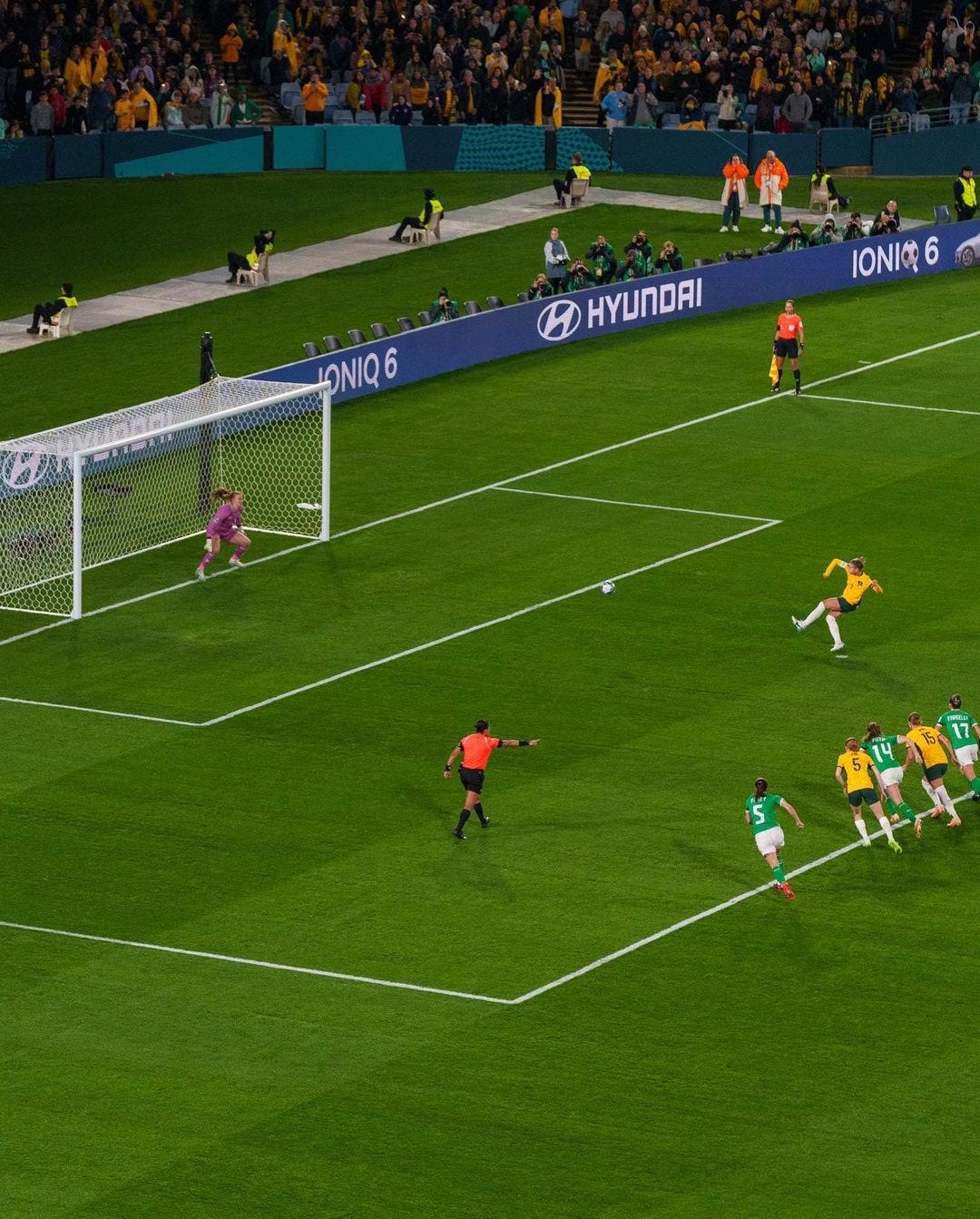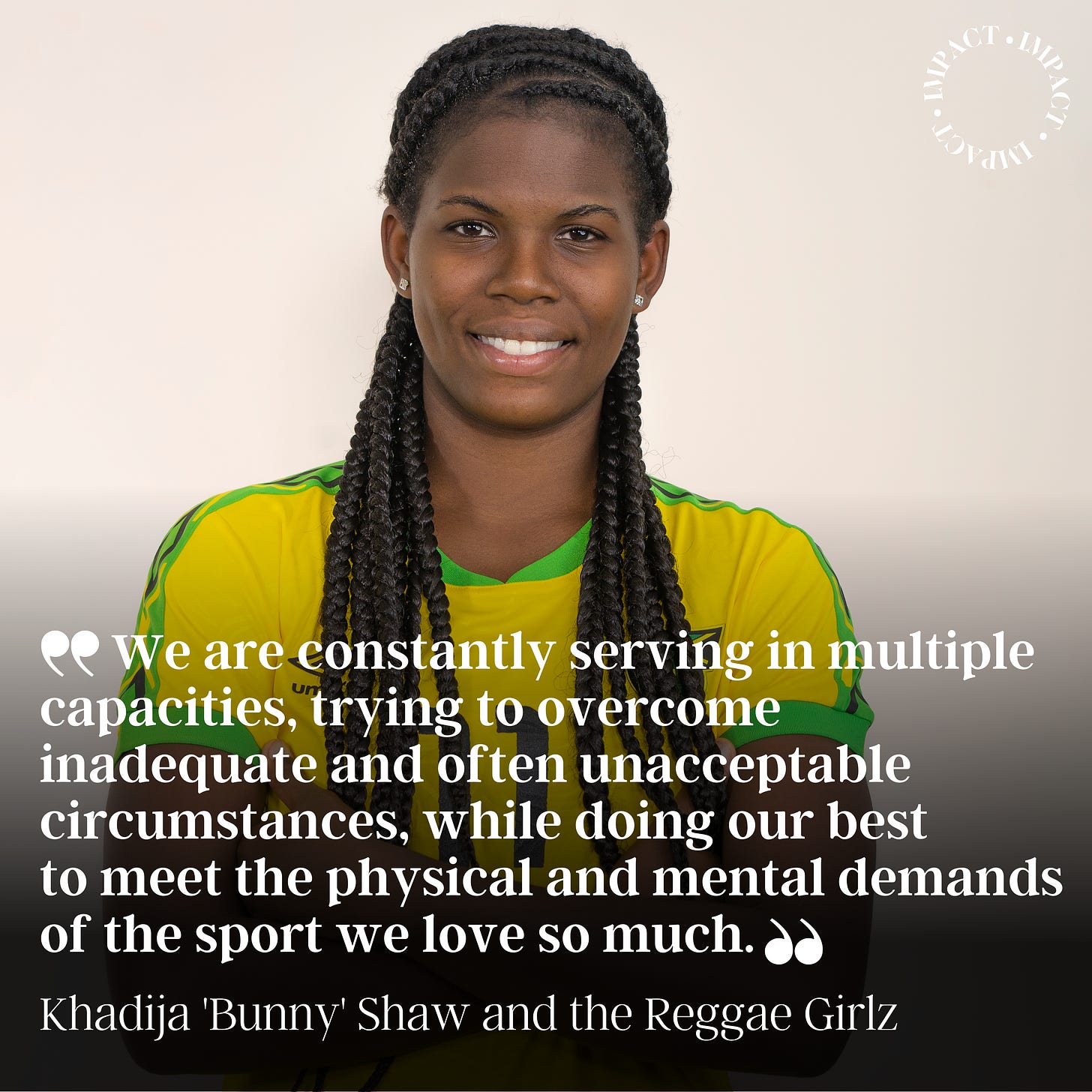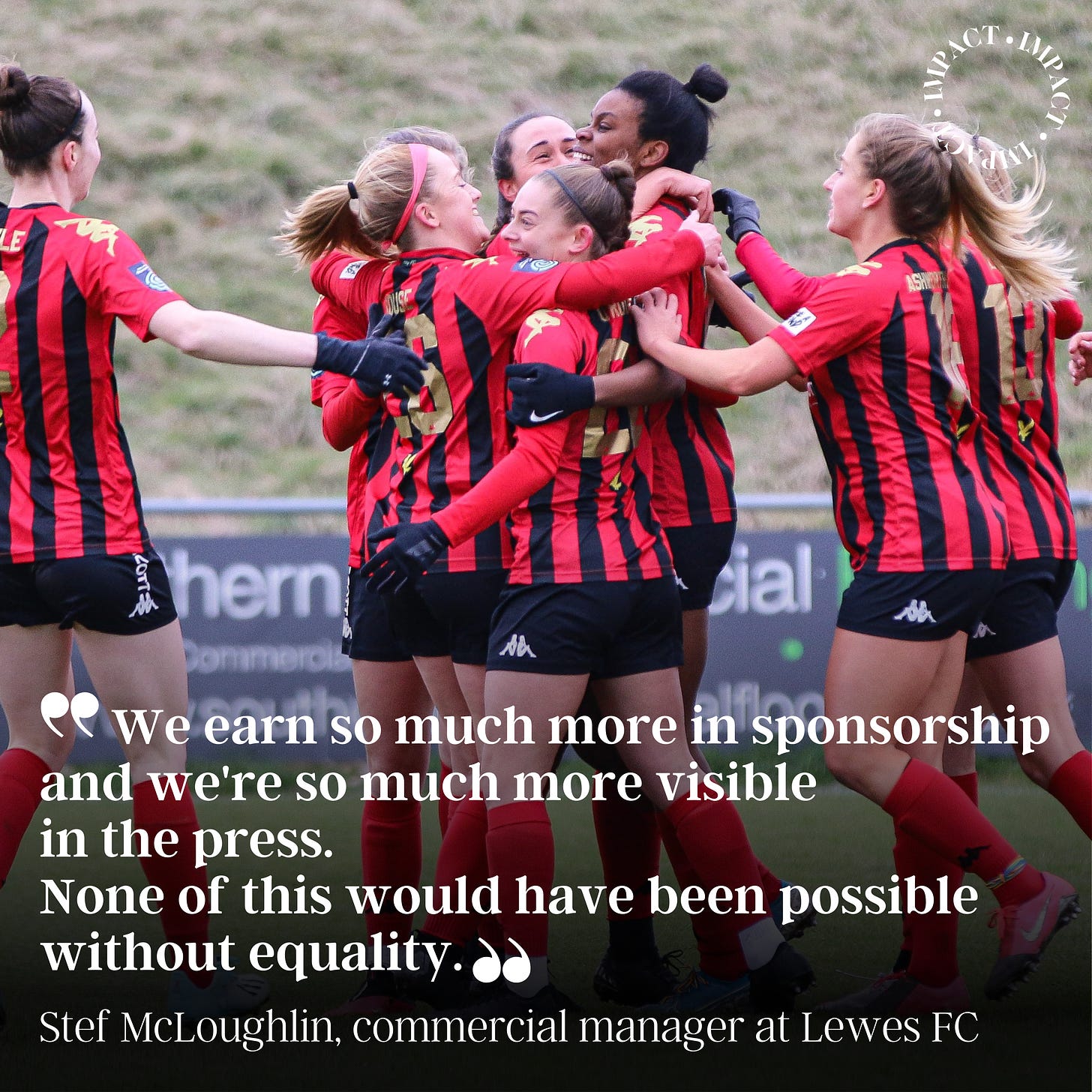
Welcome to the summer edition of the Impact newsletter, dedicated to feminism and football in celebration of the 2023 World Cup. We’ll be covering the highs and lows of the beautiful game on the pitch, and the fights for equality on the sidelines. Today, sports journalist Esther Owusua Appiah-Fei dives into the campaigns for equal pay being waged by players against their federations. You’ll learn about:
- The Nigerian player who became the first African person to score in three consecutive World Cups (yes, including men).
- How her team’s activism pushed FIFA to invest more in women players.
- The only team in history to successfully win the fight for equal prize money.
If you want to stay up-to-date on feminism worldwide, follow us on Instagram and LinkedIn.
Parlez-vous français ? Impact is also available in French:
By Esther Owusua Appiah-Fei
The 2023 World Cup is predicted to be the best attended women’s sporting event ever. The tournament, hailed as the greatest in history, has smashed international ticket sales records and domestic attendance records in host countries Australia and New Zealand.
Under the floodlights of Eden Park in Auckland, 42,137 spectators watched New Zealand beat Norway to kick off the competition, which is being fought out by a newly expanded pool of 32 teams in 2023. The Matildas of Australia also made history after 75,784 fans and 4.88 million viewers tuned in to witness them glide over the Irish in a dramatic 1-0 showdown — the highest attendance and viewership for a women’s sports game in the country’s history.
But the enthusiasm of spectators has not been matched by support from country football federations, which continue to underpay players and neglect the development of the women’s game.

The fight for fair play
In the lead-up to the competition, dozens of players took action against their respective federations, which are responsible for governing football within countries, demanding to be paid what they are worth. These disputes that involved some of the most successful teams in the world as well as competition underdogs with fewer resources.
After years of problems with the Jamaica Football Federation, the women’s team had to launch the “Reggae Girlz Rise Up” GoFundMe to even make it to the World Cup at all. The fund, set up by midfielder Havana Solaun’s mother, raised more than $50,000 to support the players. On June 15th, the team, led by captain Khadija “Bunny” Shaw, expressed their “utmost disappointment” in their federation for failing to meet their demands including “contractually agreed upon compensation”. Despite their strained circumstances, the team recorded the country’s best-ever international results of either the men’s or the women’s teams by qualifying for the knock-out stages — they take on Colombia tomorrow in a battle to reach the quarter finals.

Nigeria’s Super Falcons have had a record-breaking appearance so far, becoming the first African team to make back-to-back round of 16 appearances at a Women’s World Cup, with the electrifying Asisat Oshoala the first African player of any gender to score in three consecutive World Cups. They will take on England this morning hoping to advance to the quarter-final. Yet before the competition, Coach Randy Waldrum expressed his dismay at the treatment of his players at the hands of the Nigerian Football Federation, claiming he and the squad are owed unpaid wages. The team had threatened to boycott their opening match against Canada but ultimately decided to play.
It is a similar story for South Africa, the reigning champions of the Africa Cup of Nations who came back from a shaky start to defeat Italy and progress to the round of 16, before losing 2-0 to the Netherlands and exiting the competition yesterday.
Before the competition, the members of Banyana Banyana went on strike from national team duties and boycotted a pre-World Cup friendly against Botswana. At the last minute, coach Desiree Ellis had to assemble a back-up team that included a 13-year-old player in order to go through with the game. After that embarrassment, the Motsepe Foundation, one of the largest philanthropic organisations in South Africa, donated $320,000 to the players going to the World Cup to try to resolve the dispute.
Even former champions from richer countries have had to fight for equal opportunities. Olympic gold medallists Canada entered the World Cup in a dispute over equal pay, and will go home with more questions than answers after failing to qualify for the knock-out stages and striking only an interim deal with their federation.
And the English Lionesses may have united their country in footballing euphoria after winning the Euros last year, but they still have not achieved equal status with the less successful men’s team — the Lionesses released a statement ahead of the World Cup saying they have halted bonus talks with the England Football Association, which will resume after the World Cup. They play Nigeria this morning.
FIFA to the rescue?
There should be some relief coming from football’s global governing body FIFA, which announced that $49 million out of the competition’s $110 million prize pool will be allocated to individual players, with each player receiving a minimum payment of $30,000 and the members of the winning team taking home $270,000 each.
Speaking to the Nigerian team after their 0-0 draw with Ireland, outgoing FIFA general secretary Fatma Samoura commended them for their activism. She told the Super Falcons: “It is because of you that for the first time in the history of FIFA, the FIFA women’s world cup prize money will be paid directly to you, the players.”
But the payment is not that simple. Some players accuse their federations of deciding there is no need to add appearance and performance fees for their players on top of this pay-out. The Guardian has reported that the failed bonus negotiations between the Lionesses and the English Football Association is believed to be linked to this issue.
And in a press conference in June, FIFA president Gianni Infantino could not confirm that the money would actually reach the players. Infantino said FIFA will instead rely on the individual federations — the same organisations that many teams are in disputes with — to disburse the funds.
The power of equality
The gap between men’s and women’s World Cup prize money remains: the winnings for the men’s World Cup in Qatar totalled $440 million — four times higher than the funds on offer to the women playing in Australia and New Zealand this year. Only one federation offers its players equal prize money for playing in a World Cup: the USA, after its women’s team struck a historic equal pay deal in 2022 after a long and arduous fight to receive the same compensation as their male counterparts. Sadly for the reigning champions, they were eliminated in a heartbreaking penalty shoot-out against Sweden yesterday — their earliest ever exist from the World Cup.
And yet there are significant benefits to investing in equal pay. Lewes FC in the UK became the first team in the world to provide equal pay for men and women in 2017 and has not looked back.

“Sharing resources equally between our men’s and women’s teams led to a massive increase in attendance (456% for the women’s team and the first sell out game for both our men’s and women’s team),” commercial manager Stef McLoughlin told the Impact newsletter. “We earn so much more in sponsorship and we’re so much more visible in the press. None of this would have been possible without equality.”
On the pitch in Australia and New Zealand, most of the players have decided to set aside their disputes and focus on playing the game that unites their hearts as one, the game that others before them fought to be able play, the game that matters to them the most. The nasty work of taking on their employers to secure equality will resume after the final whistle blows on August 20th.
— Esther Owusua Appiah-Fei is a Ghanaian freelance sports journalist covering African women in sports and underrated sports in Africa. She recently organised a watch party in Accra for the Morocco v Colombia match, in collaboration with the Black Women’s Player Collective.
The World Cup last week…
Group stages
Canada vs Australia 0-4 👯
Ireland vs Nigeria 0-0
Japan vs Spain 4-0
China vs England 1-6 🥳
Haiti Denmark 0-2
Portugal vs United States 0-0
Vietnam vs Netherlands 0-7
Panama vs France 3-6 🫶
Jamaica vs Brazil 0-0
Argentina vs Sweden 0-2
South Africa vs Italy 3-2
Republic of Korea vs Germany 1-1
Morocco vs Colombia 1-0
Round of 16
Switzerland vs Spain 1-5
Japan vs Norway 3-1
Netherlands vs South Africa 2-0
Sweden vs USA 0(5)-0(4) 😱
Golden Boot 🥅
Miyazawa Hinata Japan 5
Alexandra Popp, Germany 4
Jill Roord, Netherlands 4